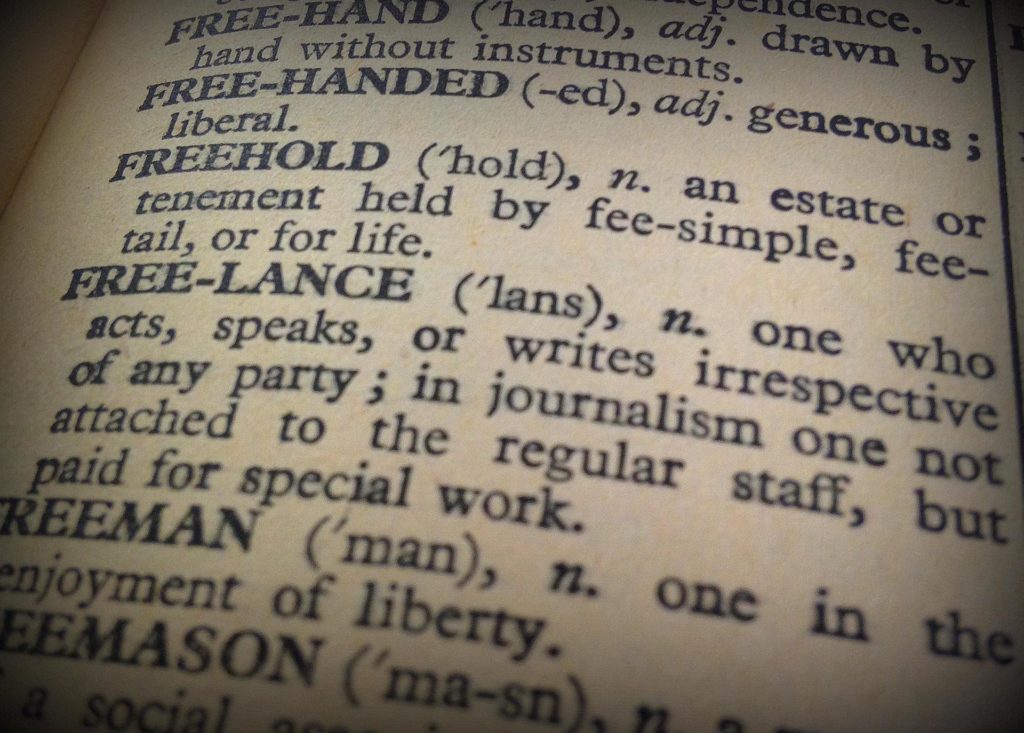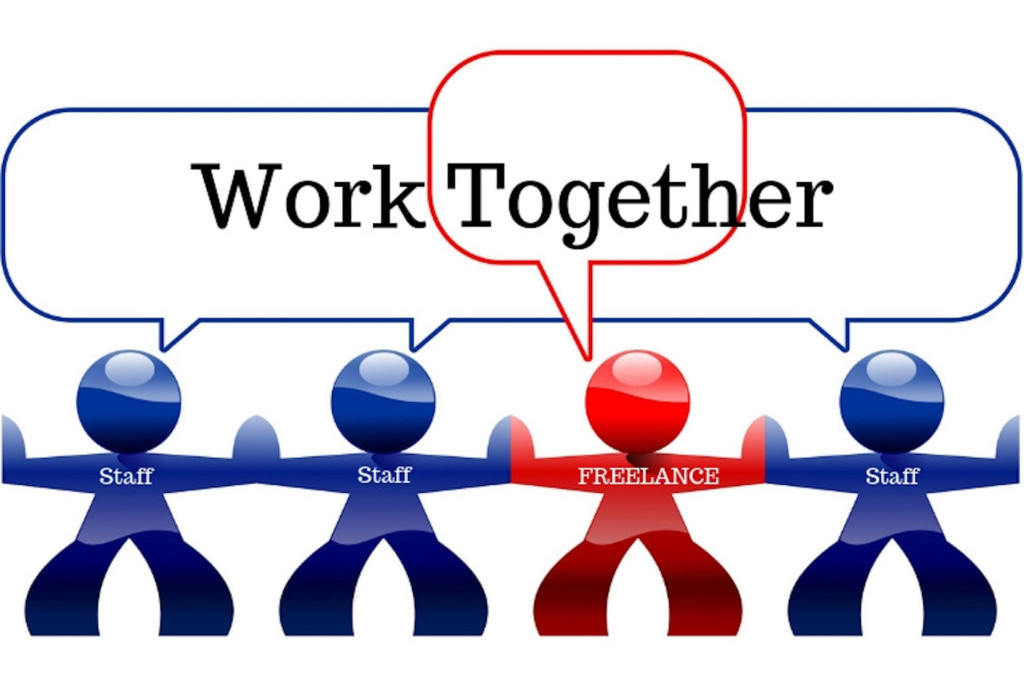Benefits of Using a Freelancer
You’ve probably heard the term “freelancer” (or have heard a professional refer to themselves as such), but may not fully understand who works this way, or what this type of work entails. Perhaps you’ve even considered hiring a freelance employee to assist with some overflow projects for your business but weren’t sure where to find them or what that working relationship would look like.
Let’s take a closer look at who freelancers are – with a focus on freelance writers, the types of writing they do, and how these professionals can benefit your company.
What is a Freelance Writer”?
The simplest freelance writer definition is a professional who accepts write-for-hire projects from several clients rather than work for a single employer. (They are sometimes referred to as “independent contractors”). They work independently, so this means a freelancer does not receive benefits from an employer as a full-time, regular employee might, so they are responsible for paying for their own health insurance, paying into retirement accounts or IRAs, and there’s no such thing as paid vacation or sick time.
But for many, the benefits outweigh the drawbacks; freelancers love the flexibility of this kind of work schedule. (Once they started freelance writing, many would not go back to traditional employment.) They can schedule calls around kids’ appointments, sports practices or games, or other family obligations. Unlike working for an employer full-time, a freelancer can be more selective about the clients they work with and the projects they accept. (Professionals work as freelancers in other areas, such as photographers, graphic designers, web designers, and even bookkeeping, accounting, and human resource consulting, but for now, we’re going to focus on writing).
Most freelancers work remotely, so they might work from home, a coworking space, a neighborhood coffeehouse, a desert island…anywhere with good wi-fi, Internet, and cell service (for calls to both clients and sources). Some might keep their freelance writing business as a strictly part-time endeavor to supplement their regular income or an outlet from their day job; for others, writing is a full-time job, all day, every day.
What Do Freelance Writers, Well, Write?
Glad you asked! If this was a FAQ page on a freelancer’s site, this question would be right near the top.
The answer is both simple and complicated. The simplest response would be “anything and everything”. But to explain further—there seem to be two set paths when it comes to freelance writing. There are those who make their living writing for magazines, newspapers, and blogs. Then there are those who handle overflow work for corporate clients. A third, smaller sector handles both types of freelance work. But the most successful freelance writers don’t accept every project that comes along (they may do this at first, but the longer they work at it, the more selective they become). Let’s take a closer look at each type of writer and the projects they typically accept.
Magazine Freelancers
Many freelancers write magazine articles. They may only write for a magazine once, or they could be a regular contributor. Most publications are considered either consumer, trade, or custom. A consumer magazine is found in your average grocery store. A trade magazine is written specifically for a niche readership, such as those who work in a specific industry. A custom publication is a magazine printed for an even smaller group (for instance, the American Legion, AmVETS, Multiple Sclerosis Society, and Rotary International are just a few examples of organizations that have their own magazines).
Bloggers
Some freelance writers do a lot of blogging, either for themselves or as a contributor to others (a “blog” is short for “weblog,” which is essentially an online journal). Sites like WordPress, SquareSpace, and Wix.com offer user-friendly templates that allow you to start a blog quickly and easily. Some writers stick to writing blogs; others use their blog as a way to write about and connect with others who enjoy the same pastimes or interests.
Blogging has many benefits. It helps writers generate content regularly so they get in the habit of writing (almost) every day, and having a blog on a website boosts a company’s SEO. It’s also a great way to feature fresh material on a website without completely revamping it. The standard industry rule is to upload at least one to three new blog posts per week.
Commercial Freelance Writers
Finally, there are commercial freelance writers, who mainly work with business clients. This is often the most lucrative, and overlooked, type of freelance writing.
Commercial writing includes content for any of the following:
- Brochures
- Annual reports
- Technical documents
- Case studies
- White papers
- Newsletter articles
- Website service pages/articles
- Management bios
How do Freelance Writers Promote Their Services and/or Find Jobs?
Like other fields, there are sites devoted specifically to freelance writing jobs. Sites like Contently, FreelanceWriting.com, and veteran freelancer Carol Tice’s site FreelanceWritersDen.com are all geared toward connecting writers and businesses who want to work with them. The rates for these jobs vary widely; there are also low-paying sites known as “content mills” that require writers to churn out pieces of varying lengths, often for a few dollars.
For freelancers looking to build a professional portfolio of “clips”, or published work, these sites are a good place to start; seasoned freelancers tend to avoid them. Of course, referrals from colleagues, networking, and checking out a writer’s profile on social media are a few other ways freelancers find work and connect with potential clients.
Benefits of Hiring a Freelancer
As a business owner, freelancers can help with some of those back-end projects that get pushed further and further down the “to do” list. If you’re unsure or uneasy about working with a freelancer, consider just a few of the advantages of hiring an independent contractor:
- No overhead. There are some cost savings for businesses who work with freelancers; one of the biggest is benefits. Freelancers would not receive things like health insurance, vacation or sick time, or any type of company-paid 401(k) or other retirement accounts. As an employer, you would strictly pay them an agreed-upon project fee or hourly rate.
- No long-term commitment. A business might work with a freelancer once or multiple times. There could be several weeks, months, or even years between projects; if the working relationship has gone well, there are always new opportunities for collaboration.
- More staff time. Working with a freelancer means they will dedicate themselves to a project which was perhaps assigned to an in-house employee who may or may not be the best one for the job. For instance, maybe you want to feature a few case studies from satisfied clients on your company’s website. You assign the task to a staff member with adequate writing skills, but neither the way with words or time to devote to the project that you’d like. This is where a freelance writer can come in and take on the project. This frees up your employee to devote themselves to more job-specific tasks.
Not every project is suitable for a freelance writer, so it’s important to speak with them at the outset and determine whether there’s a mutual fit.
Have you ever worked with a freelance writer on company projects? What was your experience? We’d love to hear from you, and are working on an article about the true ups and downs of working with freelancers. If you have any comment, email us: info@contentmender.com.






